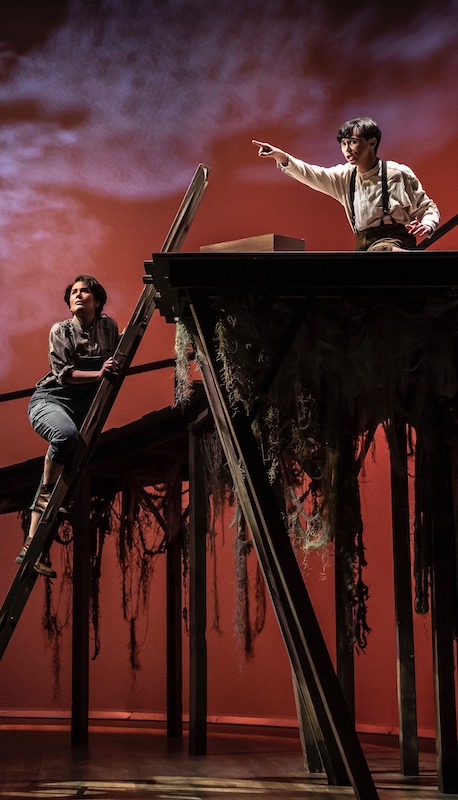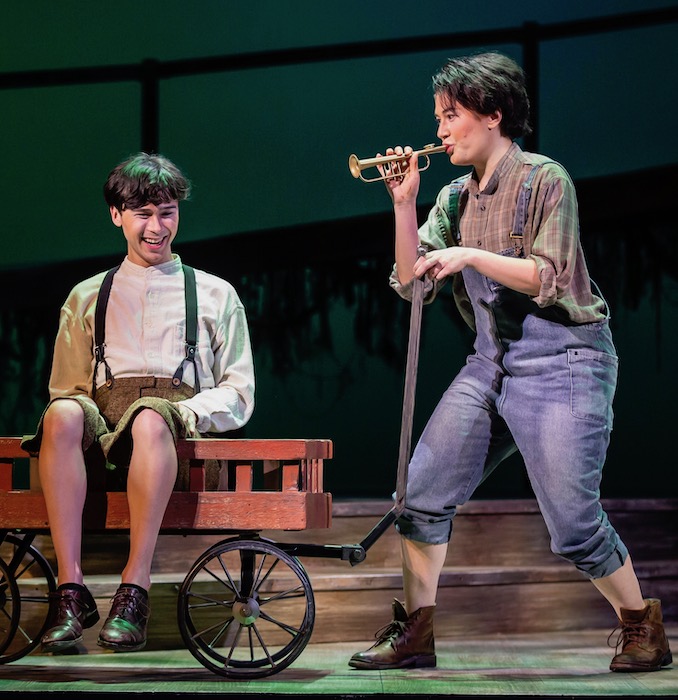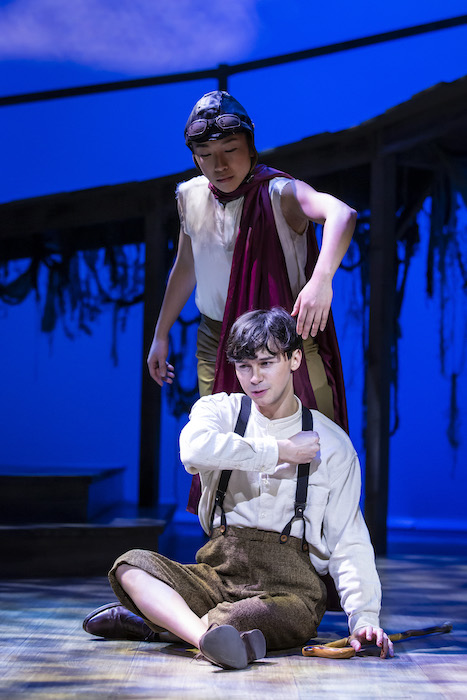COT brings an affecting family tale to compelling life with “The Scarlet Ibis”

Much has happened at Chicago Opera Theater since the company’s successful, season-opening production of Tchaikovsky’s Iolanta in November. In a major upheaval last month COT general manager Ashley Magnus was promoted to the top job of general director, replacing Douglas Clayton.
Coming right after this sudden administrative switch, COT opened its production of Stefan Weisman’s The Scarlet Ibis Saturday night at the Studebaker Theater. And it’s a testament to the dramatic power of this compelling one-act opera as well as the strength of the cast and COT artistic staff that the evening’s performance put the focus back on the stage, where it belongs.
The Scarlet Ibis debuted to positive reviews at New York’s Prototype Festival in 2015. The work is garnering wider exposure, with performances by Boston Opera Collaborative last month preceding this Chicago premiere.
The opera is based on the eponymous 1960 short story by James Hurst. Set in North Carolina in the early 20th century, it tells of the fraternal relationship between two young brothers. The older, simply called Brother, is a typically impatient youth, restless and aggressive, playing at Civil War battles. Brother’s life is disrupted by the birth of his sibling, who he nicknames Doodle. Born with a caul, Doodle is a fragile and sickly boy who is unable to walk. Yet he makes up for his physical weakness with his sensitivity and vivid imagination and dreams of being a pilot so he can fly around the world to exotic locales. Brother is conflicted by Doodle, at times loving and compassionate yet also frustrated by his physical limitations and fanciful nature. The rare appearance of a wounded scarlet ibis makes a huge impression on Doodle and he becomes more assertive to his controlling Brother, as the narrative builds to the climax with the boys lost in a rowboat during a storm at sea with tragic consequences.
Beyond its surface themes of familial dedication and the dark side of sibling rivalry, The Scarlet Ibis is about being true to one’s own nature and maintaining a sense of fantasy in a complex and often dark and dangerous universe. As Doodle says near the end of the opera, “Life is so big, and the world is so small.”
Weisman’s music wraps around David Cote’s libretto with such natural facility the two elements seem as one. The spare, folk-tinged score is consistently attractive—often as restless as Brother’s personality and at times even infused with a surging minimalism (“There is a doctor in Chicago”). Yet the opera relaxes into solo arias for all the characters that at times mine a striking degree of expressive depth.
Subtitled “An Opera in Thirteen Scenes,” Cote’s libretto flows through its individual sections seamlessly, with a wry humor that prevents the story from becoming unduly sentimental. Refreshingly, the opera takes these simple yet honest working-class people at face value without condescension or ridicule. Cote’s words never seem “written” but natural and conversational, segueing into the more metaphoric realms of the latter scenes with equal ease.
Annie Rosen has been superb in virtually every local appearance she has made on the opera stage or in concert since her time as a Ryan Opera Center young artist. It was high time this greatly gifted mezzo-soprano was given a leading part, and Rosen is absolutely sensational in the challenging trousers role of Brother.
With short hair and clad in bulky overalls, Rosen was aptly androgynous and remarkably convincing as a rambunctious young boy. Onstage for virtually the entire 95-minute opera, she wholly embodied the complex persona of this conflicted older sibling: loving and supportive to Doodle as she teaches him to walk, yet at other times harsh and cruel in her sibling jealousy—calling him a “crippled runt”—and even sadistic and dangerous. Watching Rosen staring unsmiling at Doodle, one felt Brother was capable of anything in moments of anger.
Vocally, Rosen was just as outstanding, wielding her flexible voice with great skill, with powerful top notes at dramatic climaxes and singing with tender sensitivity in her final duet with Doodle.
It’s a testament to the strength of this show’s casting that not only was Jordan Rutter just as extraordinary as Doodle—he could easily pass for Rosen’s true sibling so closely do the singers resemble each other.
The young countertenor was convincingly boyish and equally credible as the handicapped yet dreamy Doodle. His light, graceful countertenor handled all of the role’s challenges and blended smoothly with Rosen’s mezzo in their climactic tender duet, which earned an ovation from the audience.
Dramatically, Rutter conveyed Doodle’s vulnerability and guileless innocence as well as the boy’s growing assertiveness, as he seems to receive stoic strength from the dying soul of the Ibis.
The production appeared meticulously rehearsed without a single apparent opening-night glitch. Director Elizabeth Margoulis handled the nonstop, 95-minute action with fluency and ingenuity.
Her sole miscalculation was the introduction of a dancer throughout the opera. While Ginny Ngo was a graceful and sinuous presence as the Ibis, her earlier appearances as Doodle’s identically clad alter ego added little to the proceedings and only served to upstage Rutter’s peak moments.
Perhaps this is an attempted retooling of the original New York staging where Doodle was doubled by a puppet of a young boy. Still, how much more effective it would have been to save Ngo for her portrait of the climactic Ibis, rather than dilute that moment with unnecessary distracting cameos and elephantine foreshadowing.
The rest of the cast was equally ideal, vocally as well as dramatically.
As Mother, Quinn Middleman made the opening birth scene harrowing in her cries and high notes. She brought an apt nurturing quality to the role, her gently rockling lullaby to the infant Doodle (“He’s so quiet, so still”), rendered with touching sensitivity.
Company regular Bill McMurray was well suited to the role of Father. The burly singer was a strong yet sensitive paternal figure, his baritone warm yet pliant in his solo moments.
As the kindly yet superstitious Auntie who sees “bad omens” in everything, Sharmay Musacchio was amusing and occasionally irritating, as intended. Musacchio is that rarest of voices, a true contralto, and she plumbed some remarkable subterranean depths that one rarely hears from a female singer.
Jack Magaw’s economical unit set, enhanced by Charlie Cooper’s atmospheric lighting, offered a high, sloping wharf-like structure that curled around the back of the stage—providing an effective raised platform for the action as well as nicely setting the coastal Carolina milieu. Likewise Brenda Winstead’s drab-rural costuming placed the World War I period and working-class world of the Armstrong family in understated fashion.
Conductor David Hanlon made a most impressive COT debut. Leading the nine-member ensemble (string quartet, bass, oboe, clarinet/bass clarinet, bassoon and percussion), Hanlon supported the singers and stage action alertly and drew committed yet finely shaded playing from the musicians, as a unit and in their evocative obbligato solos.
The Scarlet Ibis will be repeated 7:30 p.m. Thursday and 3 p.m. February 24 at the Studebaker Theater. chicagooperatheater.org
Posted in Performances





Posted Feb 21, 2019 at 9:20 am by connie claveau
Dear David, the opera sounds delightful, I knew you were special as a writer!! You must be so proud!! Love, Connie Claveau